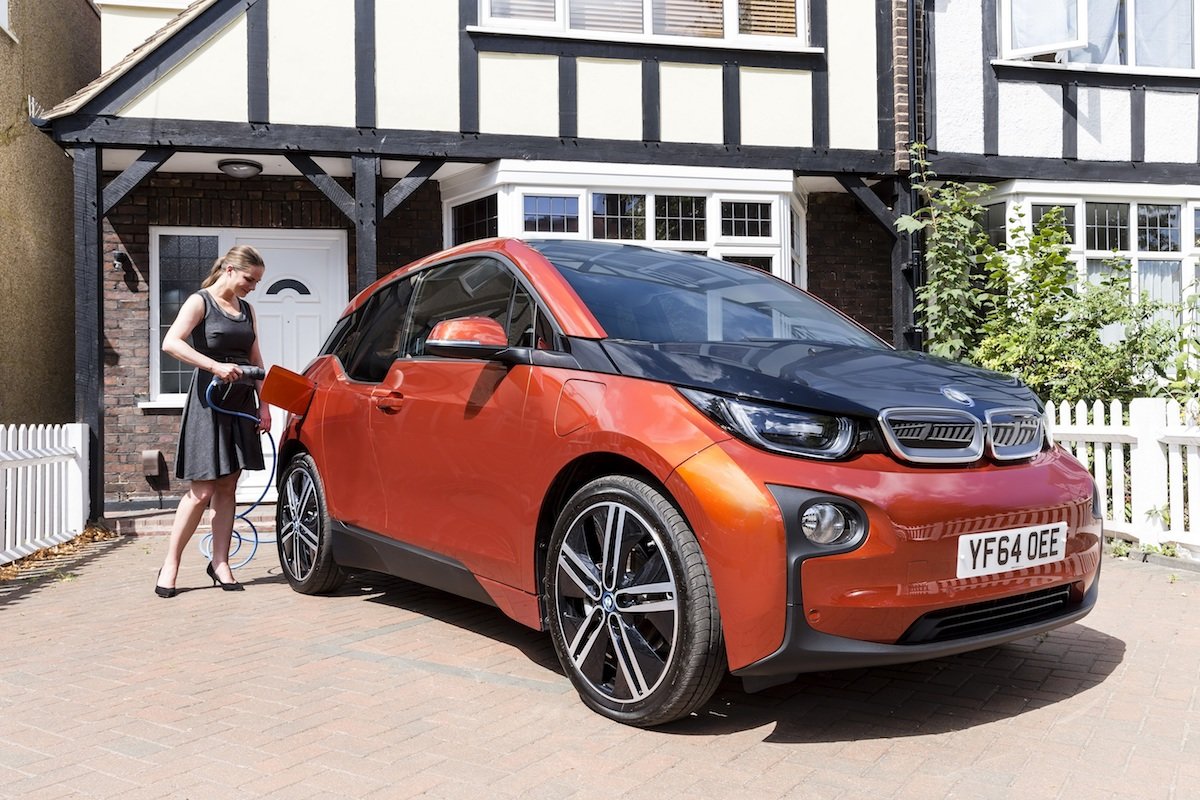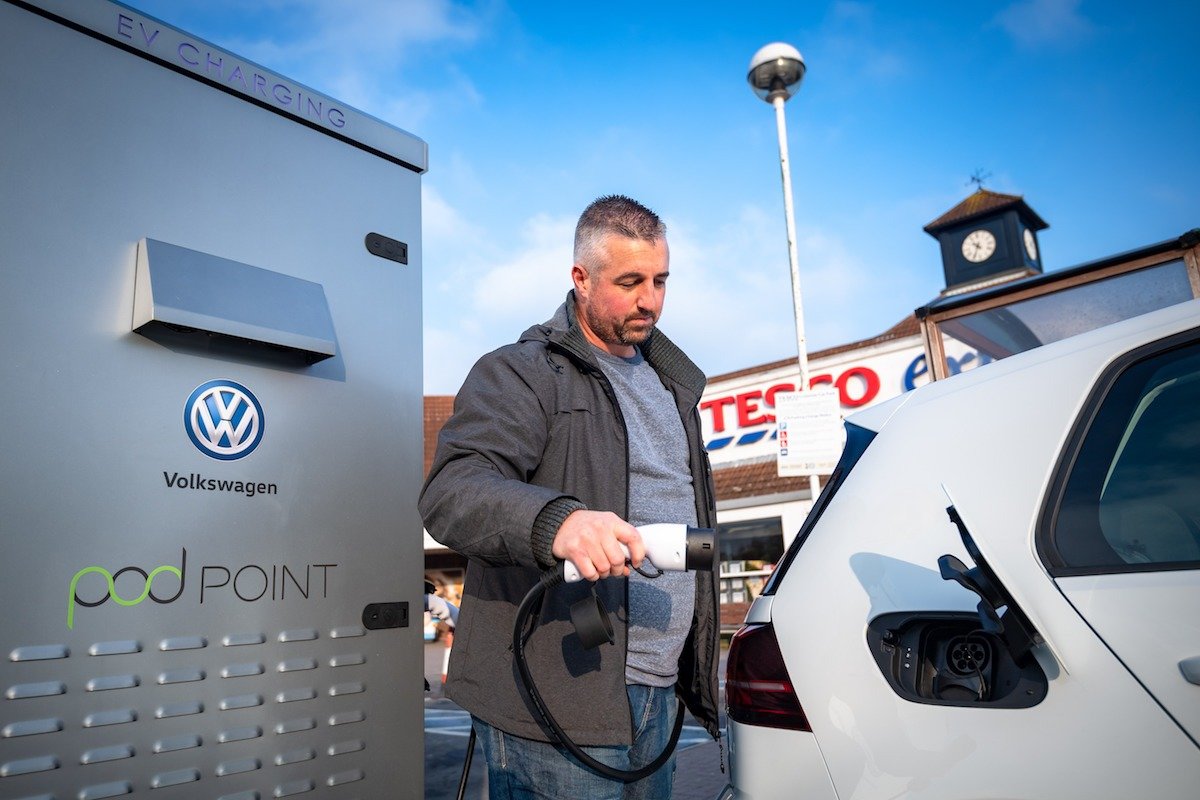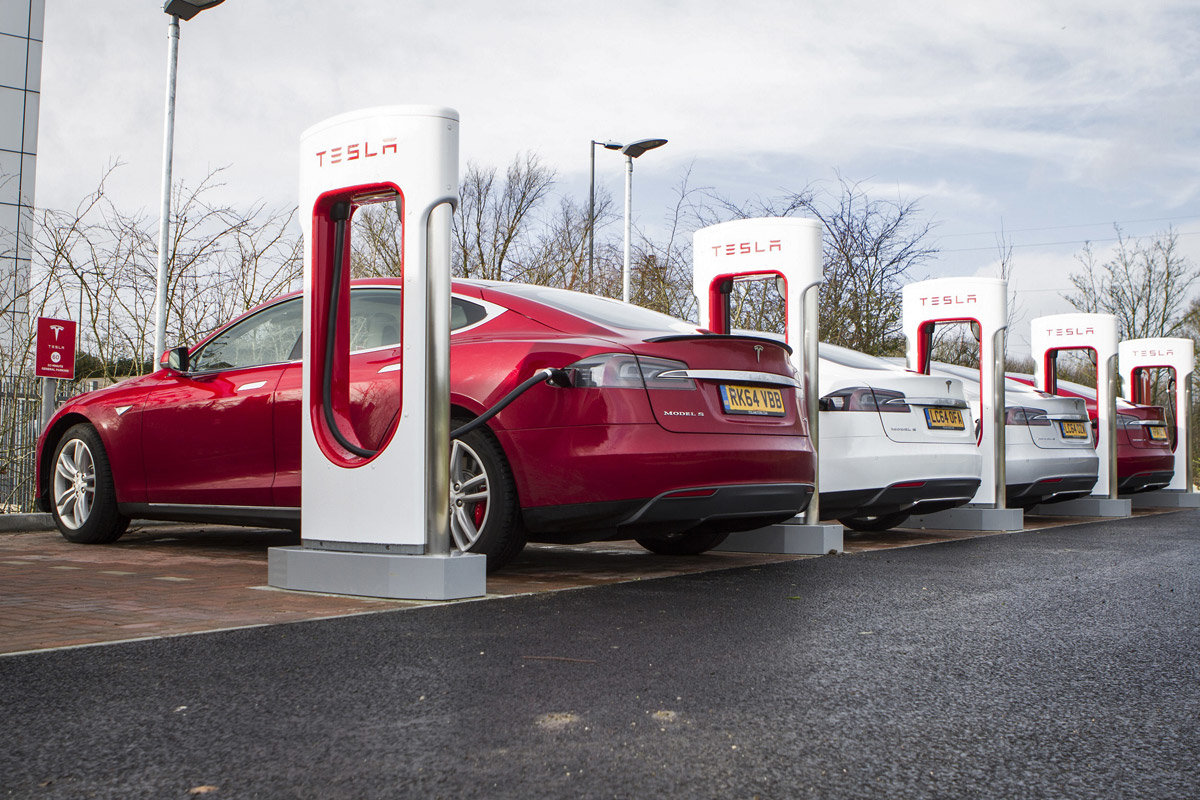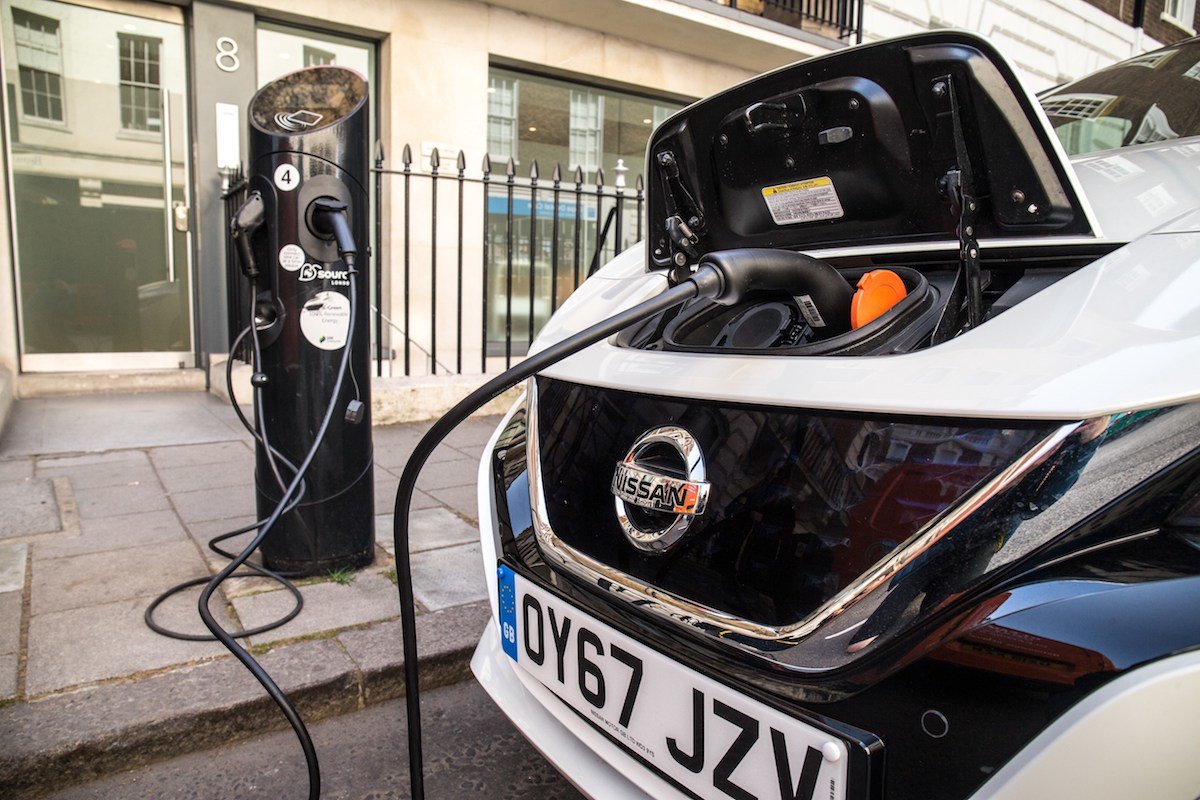The cost of charging an electric vehicle is highly variable, but it is generally cheaper than the cost of fuelling a petrol or diesel car, making it a very cost-effective way to run a car. The amount your electricity costs when charging up your electric car battery mainly depends on whether you’re using a home charging point or whether you do your EV charging at public charging points. The speed at which the charger can deliver electricity to your car, its battery size and the energy efficiency of your car will all affect how much it costs to charge your EV.
Most EV owners do the vast majority of their charging from a home charging point (more than 80 per cent), so we’ll start there. And if you want to find out about the cost of plugging in at a public charger or a kerbside charger just scroll down the page for more information about the costs of various charging networks, your charging options and the difference between the costs of fast charging and filling up at rapid chargers.
While this article is regularly updated, keep in mind that electricity costs can change at short notice. Prices are for a guide only and should be independently verified.
How Much Does it Cost to Charge an Electric Car?
- How Much Does it Cost to Charge a Car at Home?
- How Much Does it Cost to Charge an EV at a Public Charger?
- How Much Does it Cost to Charge Using the Tesla Supercharger Network?
- How Much Does it Cost to Charge at a Kerbside Charging Point?
- The Imortance of EV Efficiency
How Much Does it Cost to Charge a Car at Home?
Once you’re set up with a home charger (which costs from £800-£1,500 to buy and install), the cost of home charging will depend on your electricity tariff. At the time of writing, the average cost of electricity in the UK is capped at 34p/kWh. Electricity rates do vary from region to region and from provider to provider, so check your bill or speak to your utility provider to find the price per kWh that you pay. Once you have this, you can calculate the cost of a full charge by multiplying that price per kilowatt-hour (kWh) figure by car’s battery capacity. For instance, if you run a Kia e-Niro with a 64kWh battery and pay 34p per kWh of electricity, you’ll pay £21.76 for a full charge – i.e. 0.34 multiplied by 64. Here are some examples of how much it should cost to charge some of the UK's most popular electric cars at 34 pence per kwh:
Tesla Model Y (75kwh) £25.50
Kia e-Niro (64kwh) £21.76
Volkswagen ID.3 (58kwh) £19.72
Nissan Leaf (40kwh) £13.60
MINI Electric (32.6kwh) £11.08
For some context, we’d expect to get a real-world range of some 230 miles out of the Kia e-Niro depending on conditions, so that would work out at just around 10p per mile of driving. A petrol car doing 40mpg would cost around 18p per mile to fuel (assuming fuel costs of £1.60 per litre), while a diesel car doing 55mpg would cost more like 14p per mile (with diesel at £1.65 per litre).
That’s already a decent saving, but spend some time finding the best electricity tariff, and you can cut those charging costs even further. There are plenty of electricity deals out there to choose from, including some that are targeted specifically at EV drivers that offer very cheap electricity overnight. These are also often from providers such as Octopus, OVO and EDF, who all promise to provide energy from renewable sources, meaning that you can even help to cut the 'lifetime' emissions that your car is responsible for while finding a cheap electricity provider.
It’s easy to set an EV to charge within specific overnight hours to make the most of cheaper off-peak tariffs, too; most electric cars have timed charging settings accessible in the car’s menus or via a phone app. Smart home wallboxes also allow you to control charging hours. Take advantage of this, and you can pay as little as 5p/kWh to charge your car at home, cutting those already low fuel costs further still.
How Much Does it Cost to Charge an EV at a Public Charger?
Charging an electric car at a public charging station can vary in cost, from being free right up to costing just as much per mile as it does to fuel a petrol car.
As a general rule of thumb, the slower the charger, the cheaper it is per kilowatt-hour. Charging points are divided into several categories:
- Slow charging, typically 3-5kw and barely faster than connecting to a domestic supply with a three-pin plug. These are the slowest, and are often free.
- Fast charging, normally between 7kW and 22kW.
- Rapid charging for points between 25kW and 99kW.
- Ultra-rapid charging for points capable of delivering in excess of 100kw of charge.
Typically, ‘destination chargers’ – which refers to the slower charging points typically found in town centres, gyms or supermarkets – are cheaper, or may even offer free charging. They are also likely to be slow chargers that might deliver as little as five miles of range per hour, but it’s still useful to top-up your EV while you’re visiting the shops.
The rate you pay will vary. For instance, Pod Point’s 7kW chargers that are being rolled out in Tesco car parks are free to use. However, you might pay up to 35p/kWh for other destination chargers. If you’re looking at rapid chargers of 22kW or more it isn’t unusual to find rates of 45p/kWh, which can work out as a similar cost – or even more expensive - to fuelling a petrol car depending on the efficiency of the electric car you’re charging.
At the high end of the spectrum tend to be rapid chargers in motorway service stations. As an example, Ionity points cost around 74p/kWh, but some of these do charge at an impressively rapid 350kW.
As with any charging scenario, you can work out the cost of a charge provided you know the price per kWh for the electricity, and the amount of battery you want to charge. For instance, if need to top-up a 64kWh Kia eNiro with an extra 50% of battery from a motorway rapid charger operated by Gridserve Electric Highway, you’ll need 32kWh of energy, which will amount to £22.08 at a rapid charging station costing 69p/kWh. That works out at around 20p per mile, assuming a real-world range of around 230 miles.
If you do expect to regularly charge at public charging points, it’s worth investigating a membership with a provider such as the BP Pulse charging network, since members get cheaper electricity. You will pay a small monthly fee for a membership but it can reduce the costs of charging at a rapid charger.
It’s worth noting, however, that most of the major public charging networks such as Ionity, Shell Recharge, Gridserve and Instavolt don’t offer discounted prices for subscribers. On the plus side, contactless pay-as-you-go functionality is becoming more common.
Beware of over-stay charges at public charging stations, too. Charging time is generally limited and many will charge you a fine you if you stay longer than the designated maximum time – often 90 minutes or two hours.
How Much Does it Cost to Charge Using the Tesla Supercharger Network?
American EV manufacturer Tesla is one of the pioneers of the electric vehicle market and is unusual in that it runs its own network of chargers. In the past this meant that Tesla drivers had more flexibility when it came to public charging than owners of Kia, Hyundai, BMW, Volkswagen, or Mercedes EVs. However, Tesla has since started opening up some its charging sites for other EVs, too.
One of the early incentives for Tesla customers was the promise of free lifetime charging, but this only applies if your car was originally ordered before 15th January 2017 – so only includes Tesla Model S and Model X cars, not the newer Model 3 and Model Y.
The rate that owners of more recent Teslas and non-Teslas have to pay to supercharge varies according to energy prices. As a guide, you might expect to pay 40p/kWh to use the Supercharger network during off-peak times, increasing to over 50p/kWh at peak times. Tesla still offers its destination chargers (slower chargers found at hotels, gyms, Golf clubs etc) for free to all Tesla drivers.
How Much Does it Cost to Charge at a Kerbside Charging Point?
Kerbside charging can be a great solution if you want to run an EV but don’t have a driveway or off-road parking to allow for a home wallbox car charger. It’s becoming increasingly feasible to run an EV like this in big cities, where providers such as Ubitricity (amongst others) have fairly extensive networks of chargers at the kerbs or even in lamp posts.
Many of these chargers can be used on a pay-per-use basis with a contactless card, but if you plan to run an EV using these kerbside points regularly, you’ll may need a Smart cable. You purchase these from the network provider that you expect to use most – they typically cost between £200 and £400. Then you pay an agreed price per kWh to charge up at any charge point from that network provider.
However Ubitricity, which is owned by Shell, has phased out its smart cable plans, along with any membership subscriptions, making its chargers open to all ona pay-as-you-go basis. Costs vary, but generally hover around the 46-80p/kWh mark depending on time of day.
As with the public rapid chargers, signing up for a membership can get you cheaper charging, although some providers are phasing this out. For example, the Char.gy network of lamppost-mounted chargers used to offer a deal for subscribers which would throw in a set amount of free charging plus a discounted rate thereafter. However, this has now ended, meaning all users would pay the same rate of between 40-60p/kWh on a pay-per-use basis. This works out to just between £25-£36 for a full charge on our 64kWh Kia eNiro we’ve been using as an example.
The Importance of EV Efficiency
Don’t forget that, however you charge your EV, the car’s efficiency is critical to how much you pay per mile – and to running costs in general. For instance, the Audi E-Tron or Jaguar I-Pace or Mercedes EQC are powerful, four-wheel-drive electric SUVs that may well be only half as efficient as the more modest Kia e-Niro we’ve used in our examples. A smaller hatchback model such as a Nissan Leaf or Renault Zoe could prove even more efficient. So, in the same way that a big petrol-powered sports SUV would cost more to fuel than a conventional family hatchback, the cost per mile to charge these fast, heavy EVs could easily be double the estimates we’ve based on the generally efficient Kia e-Niro.
Regardless of what kind of electric car you might be considering, those EV users who do most of their charging at home – especially one with cheap off-peak rates – will save the most from a switch to battery rather than petrol or diesel. But, do your research, and it’s possible to make big savings on fuel by running an electric car wherever you plan to plug in.
Search for a used electric car for sale near you





